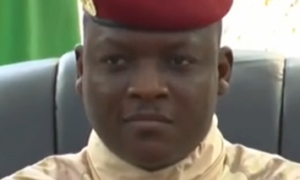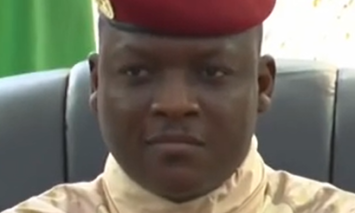In 2022 Captain Ibrahim Traore rose to power in Burkina Faso by overthrowing the previous junta leader Paul-Henri Damiba, capitalising on public anger over jihadist violence and economic stagnation. However, the evidence suggests that his ascension was not solely driven by domestic discontent, but was likely pre-coordinated with Russian interests. Pro-Russian social media campaigns had been targeting Damiba for months, branding him a “French puppet” and advocating for Russian partnerships.
IB initially tapped into profound, legitimate anger over persistent jihadist violence, entrenched poverty, and decades of perceived French neocolonial influence, as well as the failures of both pre-coup democratic and military governments. He had previously expressed deep-seated disillusionment with the country’s leadership, citing the stark contrast between the lack of equipment for Burkinabe soldiers and the rampant corruption among politicians, who were perceived to be more focused on lining their pockets with “suitcases of money” through bribery.
This narrative of corruption and mismanagement is a familiar trope in military coups, where incoming leaders often promise reform and accountability, only to perpetuate, if not exacerbate, the very same corrupt practices they initially condemned. Traoré’s own track record raises questions about whether his administration has meaningfully addressed these issues or merely perpetuated the cycle of corruption and authoritarianism.
AI-generated propaganda
Traoré’s rise to power was accompanied by a torrent of AI-generated propaganda sustaining his cult of personality. Deepfake videos show celebrities like Beyoncé, P. Diddy, and R. Kelly singing praises of him, while fictitious policies like tax abolition or free housing flooded social media. These videos spread rapidly on WhatsApp, Facebook, Instagram, and TikTok, targeting West African audiences.
Hundreds of fake videos circulated in Q1 2025 alone. For instance, BBC Monitoring identified a deepfake video in March 2024 falsely depicting Nigerian musician Burna Boy endorsing Traoré, which garnered over 1 million views on TikTok before removal. Meta’s quarterly threat reports consistently flag thousands of AI-generated posts from Burkina Faso-linked accounts. These push fictitious policies like Traoré’s Free University Initiative, present altered battle imagery, or claim Burkina Faso launched a new car manufacturing factory – later exposed as featuring a Chinese-made vehicle.
Disinformation
Complementing these extensive efforts, a sophisticated disinformation campaign surrounding Traoré’s regime employs low-tech manipulations and mislabeled videos to sway public opinion. Notably, footage purporting to show pro-Traoré rallies in Europe has been debunked, with one example being a video of a rally in Belgrade mislabeled as taking place in France.
Furthermore, videos supposedly featuring Traoré delivering impassioned anti-Western speeches have been manipulated, with the original speech often having no volume and AI-generated narration added as “translation”. This campaign is crafted to be emotionally charged and highly shareable, leveraging social media algorithms to maximize its reach. By utilizing a combination of misleading content and strategic dissemination, the campaign aims to shape public perception and advance Traoré’s narrative.
However, it’s concerning that even astute observers have been misled by the elaborate propaganda surrounding Traoré’s administration. Moreover, research indicates that Traoré is successfully winning the hearts and minds of many Africans, particularly among the youth on social media and in Pan-Africanist circles, who are drawn to his anti-colonial rhetoric and promises of sovereignty. This underscores the importance of scrutinizing narratives and promoting evidence-based analysis, especially in an increasingly complex information landscape complicated by AI-generated content.
Supporting independent local media outlets such as L’Événement, Radio Omega, Studio Yafa, CENOZO, and many others, which operate under severe threat, and demanding transparent audits of resource deals and sovereign debt agreements are practical steps towards enhancing accuracy and depth in coverage. By doing so, we can contribute to a more informed public discourse, essential for holding those in power accountable and promoting genuine progress.
By ESS Donli

